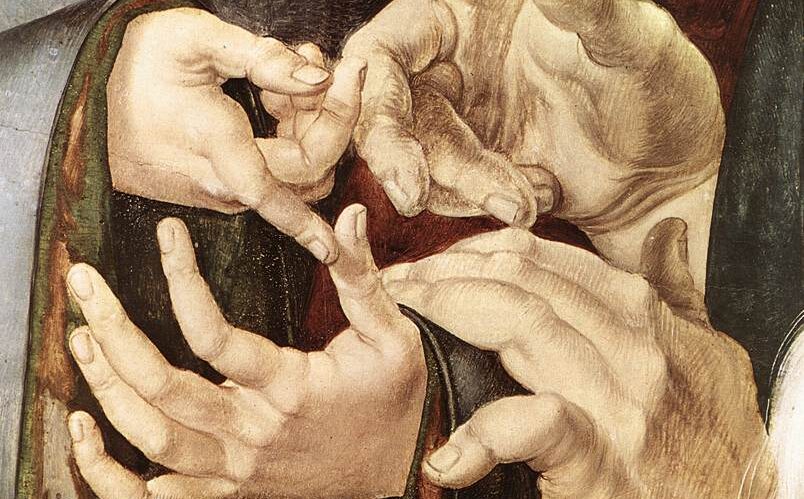This essay first appeared in our weekly Scripture reflection newsletter on September 28, 2024.
I’ve always been interested in how the Gospels were edited. My New Testament professor, Daniel J. Harrington, S.J., used to tell our class to imagine the evangelists (Matthew, Mark, Luke and John) sitting at their desks surrounded by scraps of paper, on which were written the oral traditions of the early church. On one scrap there might be the story of the Multiplication of the Loaves and Fishes, on another a “controversy story” where Jesus confronts his opponents, on another an independent saying.
New Testament scholars believe that Mark’s Gospel was written first (around AD 65) and that Matthew and Luke, written a few decades later, drew on Mark but also on a collection of sayings called “Q” (for Quelle, or Source, in German) as well as material specific to their own communities. John knew some of these stories but also drew on traditions that were quite different. In John, for example, we see some stories that don’t appear at all in Mark, Matthew and Luke (called the Synoptic Gospels, since they can be seen with the “one eye”), like the story of the Raising of Lazarus.
Jesus uses strong language and vivid imagery to make an important point: nothing should get in the way of our relationship with God or our following of Jesus.
That brings us to Jesus’s striking sayings in today’s Gospel, where he says that if your hand or foot causes you to sin, you should cut it off. Likewise, if your eye causes you to sin, you should pluck it out. As John R. Donahue, S.J., says in the HarperCollins Bible Commentary, in this section of Mark’s Gospel we find “independent sayings,” gathered in one place to make a point. These metaphors, says Fr. Donahue, suggest that “self-mutilation is better than losing the opportunity to enter the kingdom of God.”
Strong stuff.
This used to be called “Semitic hyperbole” on the part of Jesus, but today we can just say “hyperbole.” Jesus uses strong language and vivid imagery to make an important point: nothing should get in the way of our relationship with God or our following of Jesus.
Let’s be clear: Even if we are a burglar who sins by stealing, Jesus doesn’t want us to literally cut off our hands. (He also doesn’t expect the “dead to bury the dead,” as in Lk 9:60.) We should remember Jesus’s use of hyperbole to make a point. But we also shouldn’t water down his message.
What kinds of things stand in the way of our own entrance to the reign of God?
So, what kinds of things stand in the way of our own entrance to the reign of God? What are the “hands” and “feet” and “eyes,” so to speak, that are causing us to sin? If we use hands as a metaphor, perhaps it’s a kind of greediness that makes us think that we should have everything that we want. Or maybe we want the “gold and silver” talked about in the Letter of James today. Or maybe we think we deserve that everything in our lives should be perfect. That’s a form of greed, too. When we think of “feet,” maybe we are tempted to, in a sense, “kick” others who bother us, annoy us or simply disagree with us. We get so angry at their opposing us that we want to harm them. When we think of “eyes,” maybe it’s a sense of vanity: staring at ourselves in the mirror, or wanting everyone to admire us and think well of us.
All these things can stand in the way of our following God and so therefore must be “cut off” or “plucked out.” St. Ignatius Loyola used to call them “disordered attachments.” No need to do that to our hands and feet and eyes. But whatever keeps you from following Jesus needs to go.




